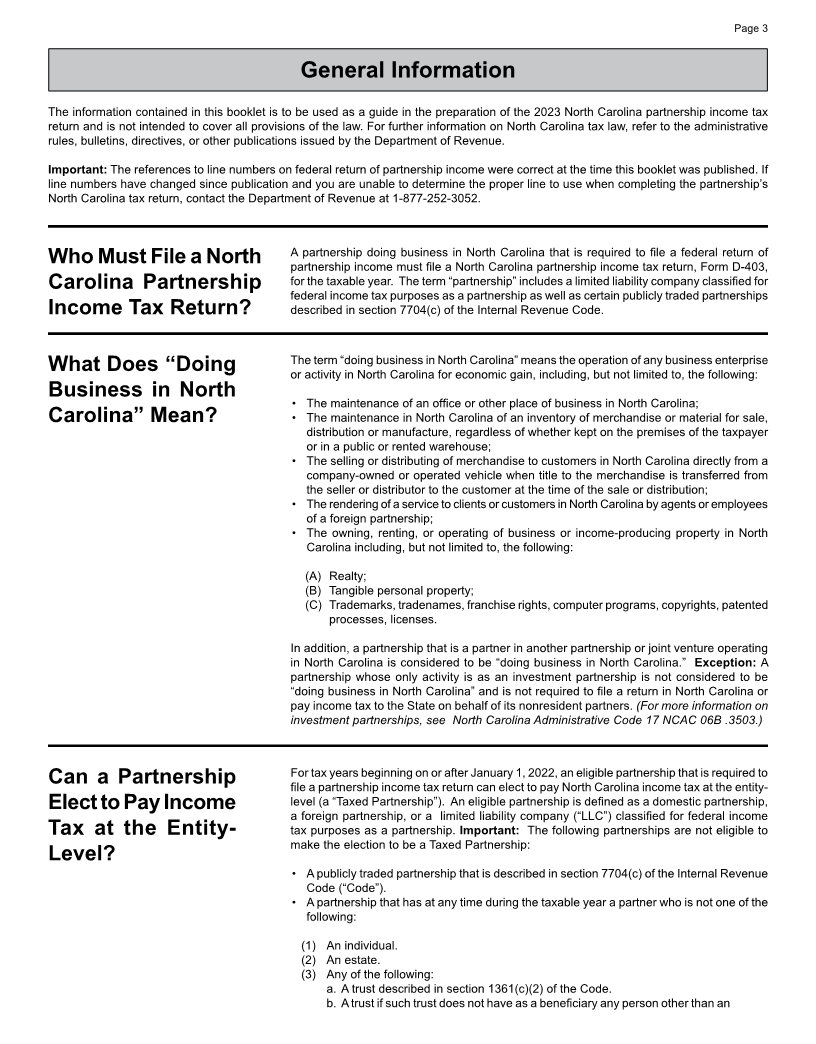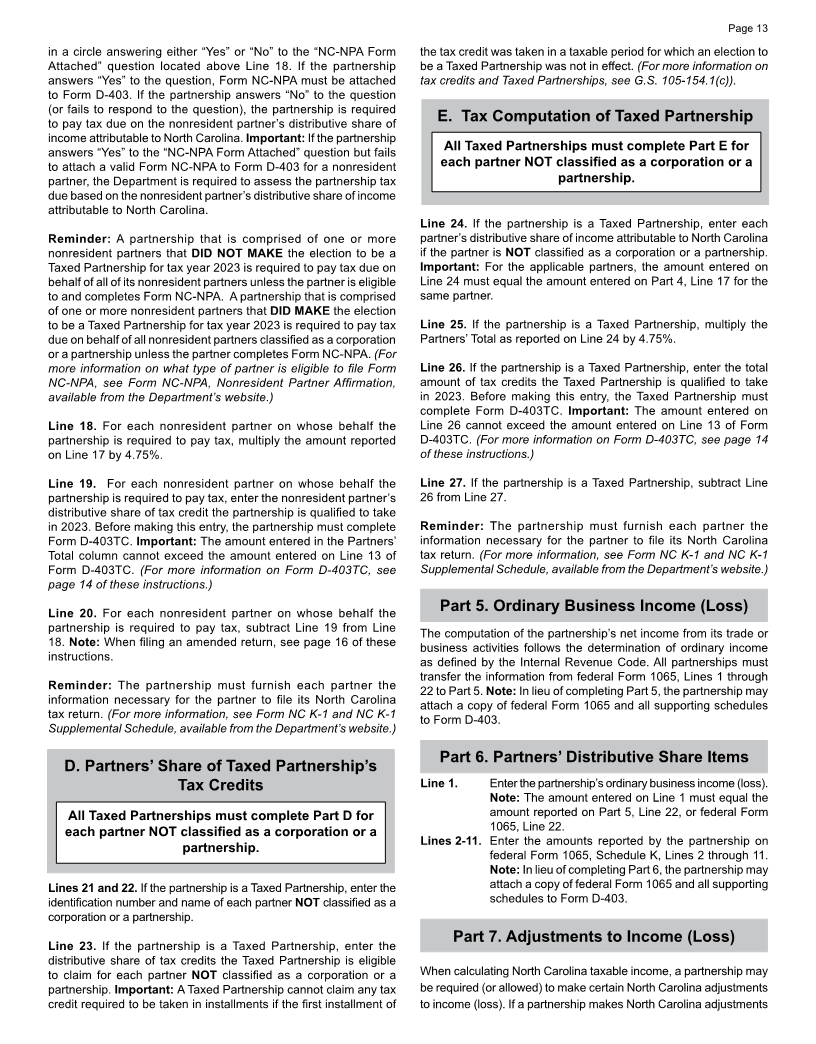- 16 -

Enlarge image
|
Page 16
Instructions for Amending Form D-403, Partnership Income Tax Return
A partnership must use the 2023 Form D-403 to amend its 2023 partnership income tax return. Unless specifically instructed otherwise,
the partnership should complete the return in its entirety. For lines on the amended return that are unchanged from the original return, the
partnership should enter the amount from the original return.
When filing an amended Form D-403, fill in the “Amended Return” circle located in the demographic section on page 1, and provide a
complete explanation as to the reason(s) for filing an amended return in the space provided on page 5 of Form D-403. You must also attach
the following information to the partnership’s amended return as documentation to support the changes, if applicable:
• A copy of a federal audit report.
• A copy of an amended federal Form 1065 or federal Form 1065-X and supporting federal schedules and forms if changes are also
applicable to your State return.
• Form NC K-1 to verify tax payments made on the partnership’s behalf by other pass-through entities.
• Federal Form 1099 statement(s) to verify a change in income tax withheld.
• Any other required schedule or supporting form.
If the partnership filed Form NC-PE or Form D-403TC with the original Form D-403, the partnership MUST file the form(s)
with the amended Form D-403, even if there is no change to the form(s).
Taxed Partnership Election. An eligible partnership MAY NOT make or revoke the Taxed Partnership Election by filing an amended Form
D-403 after the original Form D-403 is filed.
Part 1, Lines 1 through 10. Make any necessary changes to the original Form D-403 by showing the corrected amount on Lines 1 through
10, if applicable. Important: If the amount reported on Lines 4 or 6 is different from the amount originally reported, enter the amount from
the corrected Form NC-PE. Attach the corrected Form NC-PE to the amended Form D-403. Note: If you are filling out the handwritten
version of Form D-403, and the corrected amount of Line 1, 3, 5, 7, 8, 9, or 10 is negative, fill in the circle located next to line.
Part 1, Lines 11 through 13. Before making necessary changes to these lines, you must complete Part 4. If the amount reported on Line
12 is different from the amount originally reported, you must attach the corrected Form D-403TC to the amended Form D-403.
Part 1, Lines 14a through 14d. Make any necessary changes to the original Form D-403 by showing the corrected amount on Lines 14a
through 14d.
Part 1, Line 15. Enter the amount of North Carolina income tax paid, if any, shown on Line 19 of the original Form D-403, plus any
additional tax paid after the original Form D-403 was filed. DO NOT include payments of interest or penalties (Form D-403, Line 21d).
Note: If the partnership did not pay the amount of tax reflected on Form D-403, Line 19, enter only the amount of tax actually paid.
Part 1, Line 17. Enter the amount of overpayment, if any, shown the original return (Form D-403, Line 23). If the overpayment claimed on
the original return was previously adjusted by the Department, enter the adjusted overpayment on Line 17. Important: Include any portion of
the overpayment that was previously refunded, applied to any outstanding debt or estimated income tax, or contributed to the North Carolina
Nongame and Endangered Wildlife Fund or the North Carolina Education Endowment Fund. DO NOT include interest received on any refunds.
Part 1, Line 18. If Line 17 is greater than Line 16, the partnership previously received a refund greater than it was entitled to. If you are
filling out the handwritten version of Form D-403, and the amount on Line 18 is negative, fill in the circle located next to Line 18.
Part 1, Line 22. If Line 22 reflects an amount due, the partnership must complete Form D-403V Amended, Amended Partnership
Income Payment Voucher, if the partnership mails a paper check for payment of tax due. Form D-403V Amended is available from
the Department’s website. The voucher allows the Department to process the amended partnership income tax return payment more
accurately and efficiently with fewer errors. Enclose the completed voucher and payment with the partnership’s amended tax return. Do
not send cash. The Department will not accept a check, money order, or cashier’s check unless it is drawn on a U.S. (domestic) bank
and the funds are payable in U.S. dollars.
Part 1, Line 24. If the partnership previously applied part or all of an overpayment to estimated income tax, (Form D-403, Line 24), DO
NOT enter the amount again on the amended return. However, if the amended return reflects an additional overpayment, the partnership
may apply that overpayment to estimated income tax by entering the amount on Line 24. The election to apply an overpayment to
estimated income tax cannot be changed after the North Carolina partnership return is filed.
Important: In order to apply an overpayment to estimated income tax, the amended return must be filed on or before the last allowable date
to make an estimated income tax payment for the tax year. For tax year 2024, the last allowable date a calendar year Taxed Partnership
can make an estimated income tax payment is December 15, 2024. Therefore, to apply an overpayment to 2024 estimated income tax,
the Taxed Partnership must file the amended D-403 on or before December 15, 2024.
Part 1, Lines 25 and 26. If the partnership previously contributed part or all of an overpayment to either the North Carolina Nongame and
Endangered Wildlife Fund or the North Carolina Education Endowment Fund, (Form D-403, Line 25 or Line 26), DO NOT enter the amount
again on the amended return. However, if the amended return reflects an additional overpayment, the partnership may contribute that
|
















